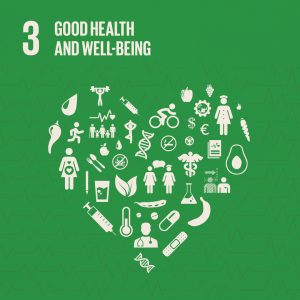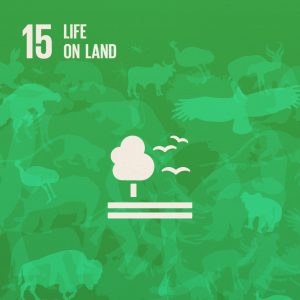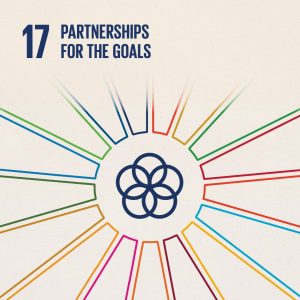By Wayde Morse, Associate Professor, Conservation Social Scientist, College of Forestry and Wildlife Sciences.
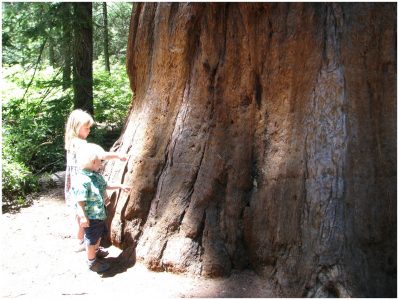
Children drawn to a large Sequoia tree.
Sometimes, when we have had enough, want to reduce some stress, just need to get away from it all – we go for a walk, or a run, or a hike, or a bike. We go outside. Sometimes we seek a challenge and adventure. We go outside. Other times it is the pull of nature, the quite breeze, the cool shaded forest, a dip in a stream or lake, peace and quiet, the chance to see wildlife and connect with nature that draws us outside. It’s also the social connections; BBQ and picnicking in the park, walking the trails, the trips with family, learning to fish or hunt, the summer camp with friends, or the long quiet walk with a new friend.
It is about that favorite outdoor place.
Think about that place…… Where is it? Why is it special? Who did you build those memories with? How old were you? What was it like? A mountain, a forest, a beach, a park, a river, a lake, your family property…. Close your eyes – what did it sound like? What do you hear? Was it hot, cold, quiet, frantic… How did it make you feel? How has it contributed to who you are today?
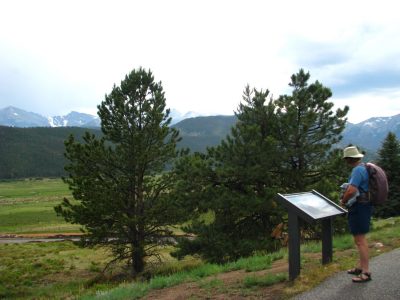
A visitor learns more about the surrounding area through an interpretive sign.
When we think of outdoor recreation it is often about the activities we do. We think of hiking, camping, mountain biking, hunting, fishing, even spelunking. It can also be time at the park, walking through greenspace, jogging on a trail, or just biking down a trail or rural road. Outdoor recreation is what we choose to do with our free time in the outdoors, primarily in the natural environment. Our first models for managing outdoor recreation were simply to provide quality environments for different recreation activities to take place. It was a bit simplistic and didn’t recognize the full contribution of outdoor recreation to our lives.
Our current models take a social psychological perspective. We look at how individuals are motivated to conduct that activity in their preferred setting with their chosen companions to achieve beneficial outcomes. That may sound like a bit of gobbly-gook, but what it means is that: when I am stressed about a test and I need to get away and burn some steam (my motivation) I choose to go to Chewacla and mountain bike because it is close by and has amazing trails (setting preference) with a couple of friends who can keep up with the pace I want to ride (companions). So we go, we ride, we get some exercise and burn off some stress, we get our minds clear to be able to get back to studying – and you ace your test. Those were your beneficial outcomes. All because you did a little outdoor recreation.
But the beneficial outcomes didn’t end there. Your friend had to rent a bike form the Auburn Outdoors program so you ended up supporting that program, the managers, and the student staff. You paid an entrance fee to Chewacla State Park and supported the conservation and management of those lands. You bonded more with your fellow riders and de-stressed so you were a lot friendlier to everyone when you got back to campus leading to the outcome of increased social cohesion. Finally, you aced your test making it more likely you will get a better job and have improved career success!
There are many beneficial outcomes of outdoor recreation that we don’t usually consider. There are the personal and psychological benefits such as building self-esteem, problem solving, and teamwork. Recreation can be a form of stress-management, reducing depression and anxiety, but also leading to challenge, and even self-actualization. We frequently find and/or tie our identity to these recreation activities – to the way we choose to spend our free time (I’m a runner, a hunter, a mountain biker..). We develop our attachment to specific locations – our sense of place. Benefits include improved health, increased strength and fitness, and a reduction in obesity. Additionally, better physical and mental health indirectly leads to lower societal health costs. There are cultural benefits including community identity, reduced alienation, and social support among many others. Direct economic benefits come from purchasing equipment, travel to and from a site, and helping support the staff at the restaurant or brew pub you visit after you’re done. There are also environmental benefits as the protection of land for outdoor recreation is compatible with wildlife and ecosystem conservation.
Outdoor recreation employs over 135,000 people in Alabama and contributes over $14 billion in consumer spending annually. It is big business that significantly contributes to our physical and mental health, toward social cohesion and good social relations, and toward conservation of our environment. All of these are intimately connected to individual and social well-being.
We have amazing settings for outdoor recreation on and near campus and throughout Alabama. In addition to walking (or jogging) across our beautiful campus we have the Donald E. Davis Arboretum for walks in nature and learning about native plants. The College of Forestry and Wildlife Services manages the Kreher Preserve & Natures Center open for hiking and educational programs just past the fisheries ponds on North College. In addition to Chewacla, Alabama has 21 other State Parks for hiking, biking, fishing, golf and many other activities. The Alabama Department of Conservation and Natural Resources Division of Wildlife and Freshwater Fisheries manages (among other lands) Wildlife Management Areas for hunting and Public Fishing Lakes. There are also a vast assortment of different trails accessible across the state including: Hiking, walking, biking, birding, equestrian, OHV, and even paddling trails. Finally, the SFWS offers a minor in Nature-Based Recreation if this turns out to be a career you want to pursue.
In these trying times there are added levels of stress and isolation. However, we are encouraged to be outside where it is generally easier to maintain a safe distance. So put on a mask, find some companions willing to socially distance, do your daily health check, and hit the trail.
Before you head out to any recreation area, please check for any setting restrictions due to COVID-19.
Post contributed by Wayde Morse, Associate Professor, Conservation Social Scientist, College of Forestry and Wildlife Sciences.
Learn about the SDGs & AU and our contributions related to this post.

